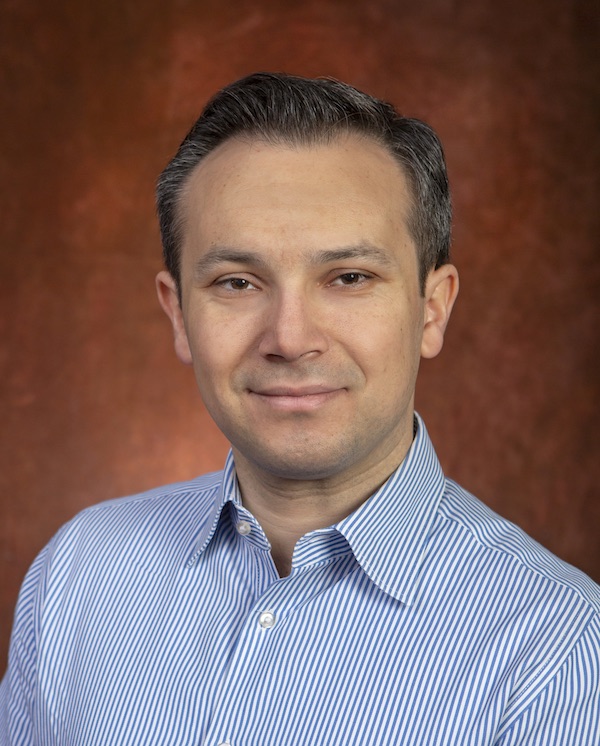Faculty Profile: Ibrahim Ekren

By: Shelby Fintak
How do we measure our time here on Earth? By the amount of money we can make in a year? By our perfect score on a difficult exam? Or is it the people we meet that are more important and their advice more life-changing than any number we can compute? For Ibrahim Ekren, Ph.D., it is the latter. He can pinpoint the three biggest influences in his career and even remains in contact with some of them to this day. Though his skill and life-long interest in mathematics guides his daily life, it is the people he meets along the way that truly leave an impression.
Ekren was born in Turkey and moved to France when he was 15 years old. "I didn't speak the language, and I realized that I could never compete with the other people academically in anything that would require knowledge about the language." This led him in the direction of math and physics, subjects at which he naturally excelled, in the universal language of numbers and logic. After high school, it was his math teacher, Michel London, that encouraged him to continue his studies in math. "He wrote my recommendation letter, I was accepted [at Preparatory Classes in mathematics], and everything followed after that. I think that was one of the biggest impacts in my life in terms of this choice."
The force of this impact lead to a trend that would continue throughout Ekren's education. After reading an article about an accomplished math finance professor, he knew that attending the university at which she taught was the next step for him. Towards the end of his master's program there, it was her and his advisor's influence that sent him even further into academia. They suggested he go work under a strong researcher in math finance, Dr. Jianfeng Zhang who would later become his doctoral advisor, at the University of Southern California. With this, Ekren moved across the globe to obtain his Ph.D. in mathematics.
Mathematicians have the image of self-centered, reserved individuals. This is not how things work. People do not just do math in their corner, they collaborate. Ibrahim Ekren
After conducting postdoctoral research at ETH Zurich and completing one year as a Post-Doctoral Assistant Professor with the University of Michigan's Department of Mathematics, Ekren accepted a faculty position at Florida State University. Our strong math finance department is one of the biggest in the U.S. - a main factor that attracted Ekren to our university in the first place - and provides plenty of opportunities for collaboration and discussion. "Mathematicians have the image of self-centered, reserved individuals. This is not how things work. People do not just do math in their corner, they collaborate." Without the empowering relationships Ekren experienced with his professors, he might not have ended up here with us today.
As a professor, connecting with others remains a potent theme for Ekren. "I used to have undergrad professors who were proud of the number of students who would drop out of the class, because it would show rigor in the class, and it is not the same thing in the U.S." The transition from France's abstract way of thinking and teaching, to the concrete and 'down-to-Earth' way of working in the United States challenged Ekren to adapt his method of teaching from what he's always known. "I realized that I needed to take into account the differences in the expectations of the students and the university… It's not about how I want to teach, but it's also how the university and students expect me to teach." Coming from the education system in France, where an average and acceptable grade is less than 10 out of 20, cultural differences obviously played a huge part in his transition to professorship in the states. It took him some time to adjust to American undergrads' mentality, but his compassion for his students and personal understanding of cultural differences made the transition one he was willing to work towards.
For Ekren, the importance of absorbing wisdom from one's academic surroundings isn't limited to the people he works with alone. Understanding the philosophy of a subject is just as important as learning the material itself. "The fact that some people say we don't use [math] after [schooling] is completely wrong, because it creates logical thinking." When you understand logic, you're more structured in your way of thinking and can easily spot false ideas. It would greatly benefit humanity if more people realize these implications, especially before raising their hand to ask 'when will we ever use this?' in one of Dr. Ekren's classes.
At the end of a long day, after working on pricing models and teaching calculus three to his undergraduate students, Dr. Ekren tries to squeeze in some relaxation time before it's his turn to look after his one-and-a-half year old daughter. "In the past, I used to play soccer, I used to run a lot, I used to ski. But that is all 'used to.'" Luckily, the academic life provides numerous opportunities to travel and add to the list of more than 20 countries Ekren has already visited. "I have never been to the south of the world, so that's the next objective." The fact he enjoys traveling is no surprise. Collaborating with researchers and experiencing cultures around the world is just another way this math finance and probability professor deepens his understanding of the way this pale blue dot in space tends to operate.

